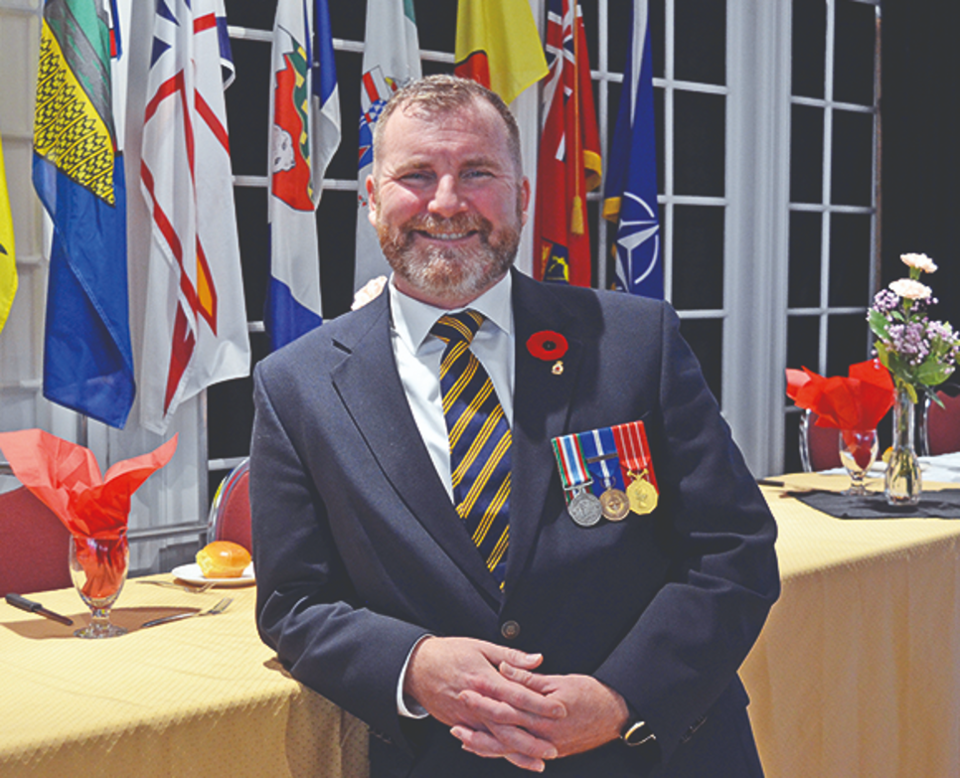Warrant Officer (Retired) Ryan Mitchell is quick with a sense of humour.
The longtime member of the Queen’s York Rangers, who saw active duty as a quick reaction force commander in Bosnia and Croatia, jokes that he’s been diagnosed with RBF – “resting bitch face,” he deadpans – but as much as dark humour is a coping mechanism, his true diagnosis is far from a laughing matter.
Medically released from the Canadian Armed Forces in 2012, Mitchell lives with an operational stress injury, once commonly referred to as PTSD or post-traumatic stress disorder.
It's a diagnosis, he says, that still carries a stigma with many military members, serving or retired, but in this next phase of his career, he’s committed to helping break down that stigma and provide military personnel the tools they need to cope through mental health first aid courses.
Such programs were just getting off the ground when the global pandemic arrived, shifting everything onto the backburner. As such, Mitchell says there’s a significant backlog of veterans who need a helping hand.
“I was medically released due to injuries outside, but later they found other injuries inside,” Mitchell shares, adding that close family and friends were less than surprised when the long-lasting internal injuries were formally diagnosed. “I have PTSD and even now it is tough to say that and get that out there.”
But getting that out there is a challenge that both he and his family have taken on.
PTSD can often be masked or misinterpreted as depression, anxiety, codependency, alcoholism and addiction.
For Mitchell and other servicepersons, the symptoms can be physical.
As November is a time for Remembrance, Mitchell often finds himself at services across Ontario to not only pay tribute to the fallen but to spread the message that it’s never too late to get help. After being on parade, he says he feels physically and mentally drained. It’s not a story that is unique to him but, as he tells his comrades, being able to tell the story is half the post-service battle.
“If we’re not educating families, friends and colleagues of what a veteran is, how can we get them support?” he says, noting that servicepersons of his generation often find it difficult to identify with the “veteran” label. “I don’t care what branch of service, I don’t care what country you’re in…if you have done basic training and you have been honourably discharged, you’re a veteran.”
Mitchell, who identifies with the term “contemporary veteran” to differentiate between our elder veterans who served in the Second World War, Korea, or other theatres of war, continues: “Getting them help is what we’re trying to do and I had to start with myself. I had to call myself a veteran. When I got my diagnosis, it took 10 years and nobody was surprised. No one. Everyone was like, ‘Yeah, we knew that a decade ago.’ The biggest thing is when you don’t think there is any other out, you’ve got to get help, but you need that help before. You need a therapist. You need trusted people.”
That is what Mitchell aims to provide in both speaking out and leading mental health first aid programs at legions but he says there came a point where his family told him he could not lead another program unless he buckled down and took the program himself – an invaluable experience, he says.
“If you start having extra pain and you don’t know why, there is a reason why,” he says. “After Remembrance Day, I can’t walk for a few weeks without struggling. I didn’t injure myself, it’s just a matter of being physically and mentally drained from that and how it shows up. Everyone has their different story, so we’re saying, ‘Tell your story. It’s OK.’ However, me saying I needed help got me medically released and I gave up my command for Afghanistan, where I was supposed to be the patrol commander. It’s still a bitter pill to swallow, but I believe God had a plan in all that.”
Despite his operational service injury and all he still has to go through today as a result of it, Mitchell still contends he would do it all again in a heartbeat – that’s what being a member of the Canadian Armed Forces is all about.
“What’s interesting about this is I still have a bit of FOMO (Fear of Missing Out) and even now I love to be needed,” he says of not being able to go to Afghanistan. “Yes, I still miss it. It’s not about the valour of the medals, it’s the lost opportunity of the [feeling that] when I was overseas I made a difference and want to make a positive difference in everything I do.
"A lot of our soldiers do that. They still miss the high. They want to do something else, and with that high – what are you going to do? Parachuting? Paragliding? Drugs? Get back into the community and make a difference – that’s what we’re trying to do… We’re competitive by human nature, so you want that next level or rung. I can now still serve by doing this, serve by giving back, and our family, too. Our kids know our job is service and we’re still trying to do that. You can still serve. You can still make a difference.
“It’s not about us, it’s about other people sharing and trying to make a great difference, we hope, in our community. If people give back and people make that mission to help others, I think we would be better off.”
Brock Weir is a federally funded Local Journalism Initiative reporter at The Auroran.



